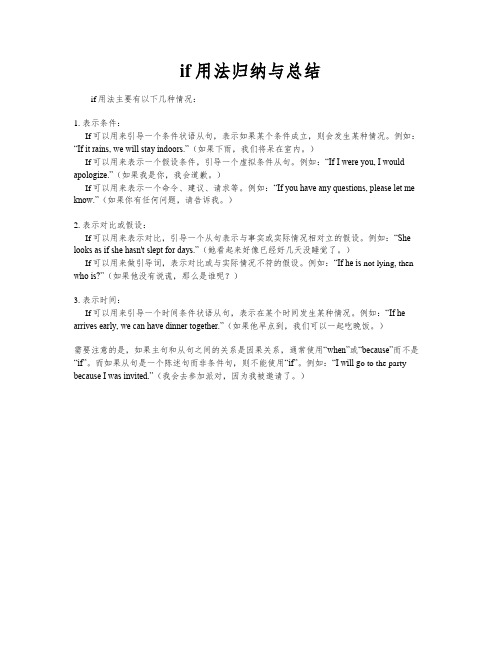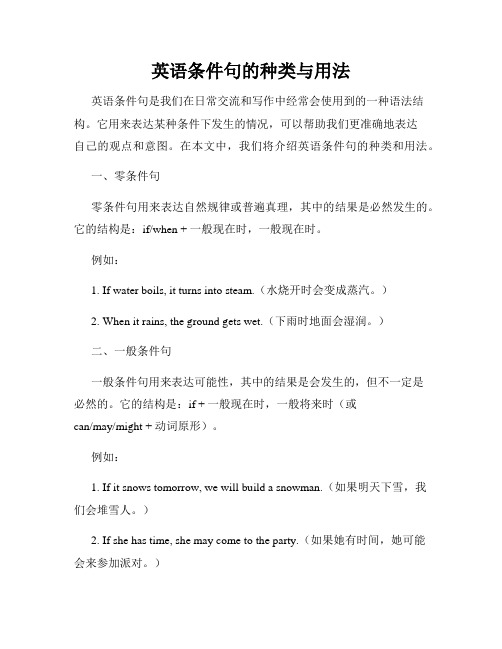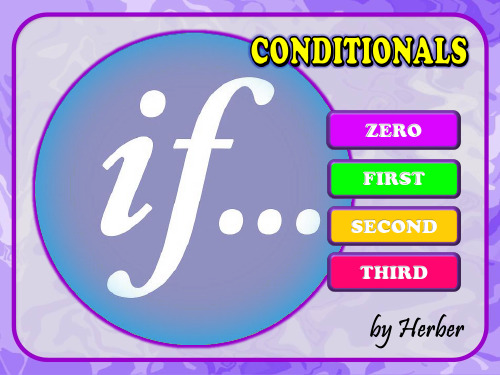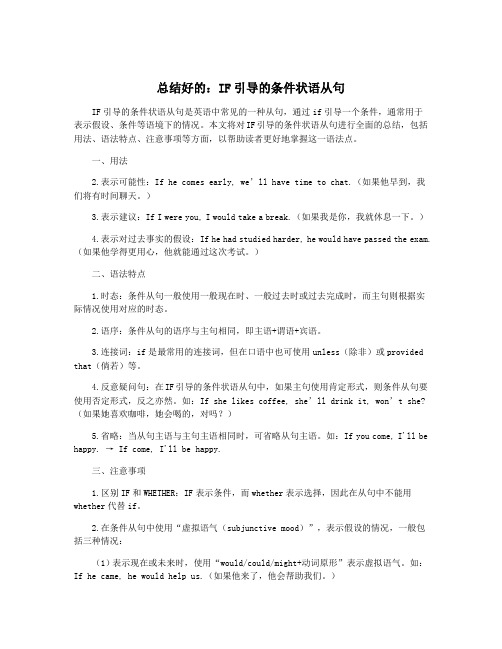if四种条件句
if用法归纳与总结

if用法归纳与总结if用法主要有以下几种情况:1. 表示条件:- If可以用来引导一个条件状语从句,表示如果某个条件成立,则会发生某种情况。
例如:“If it rains, we will stay indoors.”(如果下雨,我们将呆在室内。
)- If可以用来表示一个假设条件,引导一个虚拟条件从句。
例如:“If I were you, I would apologize.”(如果我是你,我会道歉。
)- If可以用来表示一个命令、建议、请求等。
例如:“If you have any questions, please let me know.”(如果你有任何问题,请告诉我。
)2. 表示对比或假设:- If可以用来表示对比,引导一个从句表示与事实或实际情况相对立的假设。
例如:“She looks as if she hasn't slept for days.”(她看起来好像已经好几天没睡觉了。
)- If可以用来做引导词,表示对比或与实际情况不符的假设。
例如:“If he is not lying, then who is?”(如果他没有说谎,那么是谁呢?)3. 表示时间:- If可以用来引导一个时间条件状语从句,表示在某个时间发生某种情况。
例如:“If he arrives early, we can have dinner together.”(如果他早点到,我们可以一起吃晚饭。
)需要注意的是,如果主句和从句之间的关系是因果关系,通常使用“when”或“because”而不是“if”。
而如果从句是一个陈述句而非条件句,则不能使用“if”。
例如:“I will g o to the party because I was invited.”(我会去参加派对,因为我被邀请了。
)。
英语条件句的种类与用法

英语条件句的种类与用法英语条件句是我们在日常交流和写作中经常会使用到的一种语法结构。
它用来表达某种条件下发生的情况,可以帮助我们更准确地表达自己的观点和意图。
在本文中,我们将介绍英语条件句的种类和用法。
一、零条件句零条件句用来表达自然规律或普遍真理,其中的结果是必然发生的。
它的结构是:if/when + 一般现在时,一般现在时。
例如:1. If water boils, it turns into steam.(水烧开时会变成蒸汽。
)2. When it rains, the ground gets wet.(下雨时地面会湿润。
)二、一般条件句一般条件句用来表达可能性,其中的结果是会发生的,但不一定是必然的。
它的结构是:if + 一般现在时,一般将来时(或can/may/might + 动词原形)。
例如:1. If it snows tomorrow, we will build a snowman.(如果明天下雪,我们会堆雪人。
)2. If she has time, she may come to the party.(如果她有时间,她可能会来参加派对。
)三、非真实条件句非真实条件句用来表达与事实相反或不太可能实现的情况。
它包括了三种类型:虚拟条件句(一般过去时+would/could/might +动词原形)、与现在事实相反的条件句(过去完成时+would/could/might +动词原形)、与过去事实相反的条件句(过去完成时+would/could/might+have + 过去分词)。
例如:1. If I were you, I would go on the trip.(如果我是你,我会去旅行。
)2. If I had studied harder, I could have passed the exam.(如果我学得更努力,我本可以通过考试。
)四、连锁条件句连锁条件句用来表达多个条件之间的关系。
If引导的条件句

16.The foreign friend speaks Chinese so well as if he ___ a Chinese. A. is B. was C. should be D. were
.—If he ___, he___ that food. —Luckily he was sent to the hospital immediately. A.was warned; would not take B.would be warned; had not taken C.had been warned;would not have taken D.would have been warned; had not taken
对过去的虚拟
ቤተ መጻሕፍቲ ባይዱ
If you had taken my advice, you would not have made such a mistake. If I hadn’t lived among the peasants for five years, I shouldn’t have been able to write such good novels. If he had been sent to a better hospital, the man’s life might have been saved. If I had been more careful, I could have done better.
1.If you ___ (arrive) ten minutes earlier, you could have seen them off. 2.If they___ (not help) us ,our experiment would have failed. 3. ___ I not ___ (forget) his telephone number, I would have rung him. 4.He is busy now. If he ___ (be) free, he___ (go) with you.
条件句的种类与用法

条件句的种类与用法条件句是英语中非常常见的一种句型,用来表达假设、条件或者对未来可能发生的情况进行推测。
根据条件句的不同形式以及所表达的意义,可以分为四种基本类型:零条件句、一般条件句、虚拟条件句和倒装条件句。
以下将详细介绍每种类型的条件句及其用法。
一、零条件句(Zero Conditional)零条件句是用来表达普遍真理、科学定律或者客观事实时使用的条件句。
它的形式是:if + 现在时态,现在时态。
例句如下:1. If you heat ice, it melts.(你加热冰,它会融化。
)2. If it rains, the ground gets wet.(如果下雨,地面会变湿。
)二、一般条件句(First Conditional)一般条件句是用来表达可能发生的情况或者对将来的情况进行预测时使用的条件句。
它的形式是:if + 现在时态,将来时态。
例句如下:1. If I study hard, I will pass the exam.(如果我学习努力,我会通过考试。
)2. If it doesn't rain, we will go for a picnic.(如果不下雨,我们将去野餐。
)三、虚拟条件句(Second Conditional)虚拟条件句是用来表达假设的情况,或者对过去的情况进行虚拟推测时使用的条件句。
它的形式是:if + 过去时态,虚拟语气。
例句如下:1. If I were rich, I would travel around the world.(如果我有钱,我会周游世界。
)2. If I had studied harder, I would have passed the exam.(如果我当时学得更努力,我就能通过考试了。
)四、倒装条件句(Third Conditional)倒装条件句是用来表达与过去事实相反的假设情况时使用的条件句。
它的形式是:should/ were + 主语,过去完成时态。
if四种条件句

Main clause would/could/might + have + past participle
If I had studied hard, I would have passed my exams.
IIf you had studied hard, you wouldn’t have failed your exam.
If you go to London, you must look right before crossing a street
If clause If + Past Simple
Main clause would / could / might + verb
If I were an astronaut, I would travel in a spaceship.
If I met a Martian, I wouldn’t understand him.
?
IfI aved
If I didn’t understand him, I would come back to the Earth.
If clause If + Past Perfect tense
If I were an astronaut, I would travel in a spaceship.
If I travelled in a spaceship, I would go to Mars.
If I went to Mars, I would meet a Martian.
Nice to meet you!
If I go to London,
I will see the Big Ben.
条件句的四种类型及应用技巧

条件句的四种类型及应用技巧条件句,也被称为条件从句,是英语中常见的句型结构之一。
它用于表达某个条件下,某件事情将会发生或是不会发生。
在本文中,我们将探讨条件句的四种类型以及应用技巧。
一、零条件句(Zero Conditional Sentences)零条件句用来表达一种普遍的真实情况,通常是科学事实或一般规律。
它的句型结构为:if/when + 简单现在时,主句 + 简单现在时。
例如:1. If you heat water to 100 degrees Celsius, it boils.如果将水加热到100摄氏度,它会沸腾。
2. When it rains, the streets get wet.下雨时,街道会变湿。
零条件句的应用技巧在于引述普遍事实或科学规律,揭示因果关系。
二、一般条件句(First Conditional Sentences)一般条件句常用于表达可能会发生的情况。
它的句型结构为:if +简单现在时,主句 + 将来时。
例如:1. If it rains tomorrow, I will stay at home.如果明天下雨,我将呆在家里。
2. If you work hard, you will succeed.如果你努力工作,你会成功。
一般条件句的应用技巧是预测可能发生的情况,并给出相应的结果。
三、虚拟条件句(Second Conditional Sentences)虚拟条件句用于表达与实际情况相反或不可能实现的假设。
它的句型结构为:if + 过去时,主句 + would/could/might + 动词原形。
例如:1. If I had a million dollars, I would buy a big house.如果我有一百万美元,我会买一所大房子。
2. If I were you, I would apologize to him.如果我是你,我会向他道歉。
总结好的:IF引导的条件状语从句

总结好的:IF引导的条件状语从句IF引导的条件状语从句是英语中常见的一种从句,通过if引导一个条件,通常用于表示假设、条件等语境下的情况。
本文将对IF引导的条件状语从句进行全面的总结,包括用法、语法特点、注意事项等方面,以帮助读者更好地掌握这一语法点。
一、用法2.表示可能性:If he comes early, we’ll have time to chat.(如果他早到,我们将有时间聊天。
)3.表示建议:If I were you, I would take a break.(如果我是你,我就休息一下。
)4.表示对过去事实的假设:If he had studied harder, he would have passed the exam.(如果他学得更用心,他就能通过这次考试。
)二、语法特点1.时态:条件从句一般使用一般现在时、一般过去时或过去完成时,而主句则根据实际情况使用对应的时态。
2.语序:条件从句的语序与主句相同,即主语+谓语+宾语。
3.连接词:if是最常用的连接词,但在口语中也可使用unless(除非)或provided that(倘若)等。
4.反意疑问句:在IF引导的条件状语从句中,如果主句使用肯定形式,则条件从句要使用否定形式,反之亦然。
如:If she likes coffee, she’ll drink it, won’t she?(如果她喜欢咖啡,她会喝的,对吗?)5.省略:当从句主语与主句主语相同时,可省略从句主语。
如:If you come, I'll be happy. → If come, I'll be happy.三、注意事项1.区别IF和WHETHER:IF表示条件,而whether表示选择,因此在从句中不能用whether代替if。
2.在条件从句中使用“虚拟语气(subjunctive mood)”,表示假设的情况,一般包括三种情况:(1)表示现在或未来时,使用“would/could/might+动词原形”表示虚拟语气。
if_条件状语从句_课件

*If I had known the news, I would have told you about that . =Had I known the news, I would have told you about that.
无忧PPT整理发布
Note:省略了if的倒装形式的句首不能用动词的 缩略形式 Were it not for the expense, I would go to Italy(√) Weren’t it for the expense, I would go to Italy. (×)
If引导的条件状语 从句
无忧PPT整理发布
1.真实条件句
表示的情况有可能发生,用陈述语气。 I will not go to the party if I am not invited.
2.虚拟条件句
表示的情况不可能发生或者发生的可能很小
无忧PPT整理发布
1.真实条件句
1) 主将从现 If it rains tommorow, I will stay at home. 2) 主祈从现 Study hard, if she wants to get good grades. 3) 主情从现 If you are hard-working, your parents may feel happy. 4) 主现从现 If you put ice near the fire, it turns to water.
If I had got there earlier, I would have met her.
无忧PPБайду номын сангаас整理发布
3).与将来的事实相反 If there were a heavy snow next Sunday, we would not go skating.
- 1、下载文档前请自行甄别文档内容的完整性,平台不提供额外的编辑、内容补充、找答案等附加服务。
- 2、"仅部分预览"的文档,不可在线预览部分如存在完整性等问题,可反馈申请退款(可完整预览的文档不适用该条件!)。
- 3、如文档侵犯您的权益,请联系客服反馈,我们会尽快为您处理(人工客服工作时间:9:00-18:30)。
If you go to London, you must look right before crossing a street
If clause If + Past Simple
Main clause would / could / might + verb
If I were an astronaut, I would travel in a spaceship.
If I miss the bus, I am late for school.
If I am late for school, my teacher gets angry.
If tense
Main clause will / can / may / must + verb
If I were an astronaut, I would travel in a spaceship.
If I travelled in a spaceship, I would go to Mars.
If I went to Mars, I would meet a Martian.
Nice to meet you!
IIf you had passed your exam, you could have gone to the beach.
IIf I had gone to the beach, I would have made sand castles.
If I go to London, I will see the Big Ben.
If I go to London …
I will see the Big Ben.
If I go to Buckingham Palace,
I can take a photo of the Royal Guard.
would/could/might + have + past participle
If I had studied hard, I would have passed my exams.
IIf you had studied hard, you wouldn’t have failed your exam.
If I met a Martian, I wouldn’t understand him.
?
IfI aved
If I didn’t understand him, I would come back to the Earth.
If clause
If + Past Perfect tense
Main clause
ZERO FIRST SECOND THIRD
If clause If + Present simple
Main clause Present simple
If I am late for school, my teacher gets angry.
If I oversleep …
I miss the bus.
